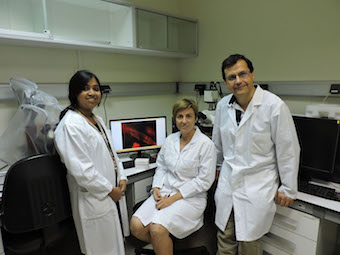
Researchers of the ERI Biotecmed of the Universitat de València and the Health Research Institute Incliva have worked together with the Myogem Health Company in the development of a food supplement to improve the quality life of people with myotonic dystrophy. The compound increases the MBNL protein available levels, whose deficiency is scientifically associated with the pathogenesis of this inherited genetic disease.
This is the first food supplement appropriated for myotonic dystrophy patients. The myotonic dystrophy is an inherited genetic slowly progressive disease that causes mainly neuromuscular and heart disorders in the afflicted people. Myo-DM, which has been recently launched, is the first food supplement made from natural ingredients with the aim of improving the quality life of the injured people. The experimental data reveals that this product increases the MBNL protein available levels, whose deficiency is scientifically associated with the pathogenesis of this inherited genetic disease.
The group of Translational Genomics, supervised by Rubén Artero (ERI Biotecmed, Universitat de València) has been the pioneer in the use of Drosohila as a tool for the search of drugs in vivo. So this becomes an international model in the test and validation of the therapeutic compounds in myotonic dystrophy. Furthermore, this is nowadays the unique lab in Spain with the ability to analyse cardiac phenotypes in this experimental animal.
The observations that have given rise to this supplement are originated in the realisation of a project funded by the La Marató Foundation of TV3 in 2009, headed by the researchers Rubén Artero and Beatriz Llamusí, both from the group of Translational Genomics of the Universitat de València.
Myogem Health Company, which is an spin-off enterprise of Inkemia IUCT Group focused on R+D and the commercialisation of new products to improve the quality life of people with minor diseases, has created the product with the support of the Centre for the Development of Industrial Technology (CDTI), by using the services of the UV research group.
The Type 1 myotonic dystrophy (DM1) or also known as Steinert disease, can appear at any time of your life. The genetic anomaly of this disease is an unstable expansion of the triple CTG located in the DMPK gene (myotonic dystrophy protein kinase) in the chromosome 19. The symptoms of this disease are highly changeable because this is a multisystem disease. The most common ones are the muscular weakness and myotonia, which consists on the difficulty of the muscles to wind down after a contraction, together with heart problems (especially arrhythmia) and the respiratory distress. The seriousness of the symptoms is directly proportional to the number of CTG repetitions.
“The commercialisation of this compound is the result of the knowledge dissemination process from the basic scientific research to the production sector”, claims Beatriz Llamusí. ‘It is very rewarding to give the citizens’ investment in research back to society in the form of a useful product for patients. This is possible through the La Marató TV3 Foundation as well as the state aids of CDTI in its final phase”, concludes the researcher.
Last update: 19 de june de 2017 11:39.
News release


















